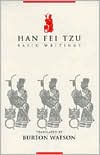

 |

|

The average rating for Han Fei Tzu: Basic Writings based on 2 reviews is 4 stars.
Review # 1 was written on 2015-06-28 00:00:00 Gary Grasser Gary GrasserWhen a sage rules the state, he does not depend on people's doing good of themselves; he sees to it that they are not allowed to do what is bad....Those who rule... devote themselves not to virtue but to law. Han Feizi earnestly sent this advice to his king, the ruler of the small state of Han. You must, he said, forswear benevolence and demand absolute adherence to strictly enforced laws and penalties so that the state's granaries are full and its armies ready. It might not have mattered anyway, but Han ignored his advice and fell to the neighboring king of Qin, who became the first Emperor of a unified China in 221 B.C. Han Feizi would have a state that has no place for commerce, the arts, religion, or anything other than agriculture and war. One has to remember the threatening times in which he lived, but even so it is a ruthless prescription. He perfected the Legalist doctrines that would guarantee the strength of the state through the ruler retaining absolute power in his own hands. This power derived not through the ruler participating in the actual administration, but in giving his ministers and their subordinates no room for independent judgement or discretion. They must fill an exactly defined role, and deviate not at all from any programs they proposed to carry out. Severe punishment and/or dismissal should follow stepping out of job-description bounds, underdelivery or even overdelivery. In this way officials could not be susceptible to bribes for things such as being excused from military service, and they would have insufficient scope for cabals. (Han Feizi doesn't address the question of how the ruler will acquire the massive amount of unbiased information needed to carry this policy out in practice.) Han Feizi has a very low opinion of the people, and dismisses any notion that the ruler needs to shape his policies to gain their trust. All this sounds insanely ruthless, but this book is a classic because the examples and reasoning he employs are very convincing. For example, he points out that all of the steps the ruler needs to follow to built up a country's defenses and ability to wage war (harder work and taxes) will be adamantly resisted by the people. Every proscription of refined life and occasional forgiveness of error is accompanied by an example of disaster befalling a ruler who was 'soft'. This being said, the first Emperor put Legalist doctrine into full practice and among the reasons for the collapse of his empire only a couple of years after he died, according to Burton Watson's introduction, was resistance to the severity of these policies. Watson provides a concise and graceful introduction that provides the necessary historical and philosophical context for this work. Han Feizi has been read ever since the book was written about 240 BC, and is well worth a look. It's short and easy to read. (And for those who read my update from yesterday, about as far from Dhammapada as it's possible to get.) |
Review # 2 was written on 2015-03-31 00:00:00 John Tranello John TranelloHan Feizi was the creator of the Legalist philosophy. Unlike many earlier philosophers, it is believed that he wrote the text primarily on his own. According to a historian named Sima Qian, Han Feizi studied under Xunzi. I found this to be particularly interesting because Xunzi was a Confucian philosopher and there is a great rift between the two schools of thought. Though when reading Han Feizi there is a strong sense of Xunzi's writing style. For example, like Xunzi, Han Feizi gives strict titles for actions and behaviors and makes it appear that you have no choice and can make no argument with what is ultimately his opinion on the matter. I will demonstrate the similarities below with examples from the two text. From Xunzi: "To lead others along in what is good is called "teaching". To harmonize with others in what is good is called "proper compliance". To lead others along in what is bad is called "flattery." (Page 262) From Han Feizi: "To kill or execute- this is what is meant by "punishment". To venerate or reward- this is what is meant by "favor". (Page 323) Unfortunately this is something I find to be very annoying because it gives me a sense of taking away free will and personal opinion. But this really makes sense with Han Feizi because legalism believes that people are naturally evil and will always try to avoid punishment while in the process of chasing gains. It supports a strict law and harsh punishments. Han Feizi also reminded me of "The Prince" by the renaissance writer Machiavelli. A lot of the book read like a guide book for rulers on the proper way to rule, as well as punish. Very much like The Prince, though perhaps a bit more extreme and harsh. |
CAN'T FIND WHAT YOU'RE LOOKING FOR? CLICK HERE!!!